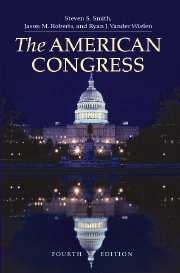Book contents
- Frontmatter
- Contents
- Preface
- 1 The American Congress: Modern Trends
- 2 Representation and Lawmaking in Congress: The Constitutional and Historical Context
- 3 Congressional Elections and Policy Alignments
- 4 The Rules of the Legislative Game
- 5 Members, Goals, Resources, and Strategies
- 6 Parties and Leaders
- 7 The Standing Committees
- 8 The Floor and Voting
- 9 Congress and the President
- 10 Congress and the Courts
- 11 Congress, Lobbyists, and Interest Groups
- 12 Congress and Budget Politics
- Notes
- Suggested Readings
- Index
- Picture Credits
11 - Congress, Lobbyists, and Interest Groups
- Frontmatter
- Contents
- Preface
- 1 The American Congress: Modern Trends
- 2 Representation and Lawmaking in Congress: The Constitutional and Historical Context
- 3 Congressional Elections and Policy Alignments
- 4 The Rules of the Legislative Game
- 5 Members, Goals, Resources, and Strategies
- 6 Parties and Leaders
- 7 The Standing Committees
- 8 The Floor and Voting
- 9 Congress and the President
- 10 Congress and the Courts
- 11 Congress, Lobbyists, and Interest Groups
- 12 Congress and Budget Politics
- Notes
- Suggested Readings
- Index
- Picture Credits
Summary
The first amendment to the constitution provides that congress may make no law abridging the right of the people to petition the government for a redress of grievances. Court rulings interpret the Amendment broadly to include organized and paid representatives of the people and therefore limit Congress's ability to regulate lobbying. In practice, interest groups and their lobbyists are a very important means by which the public conveys their expectations and demands to Congress.
Americans believe that members of Congress are beholden to special interests and lobbyists. A 1985 ABC News/Washington Post survey found that 70 percent of Americans agreed that “most members of Congress care more about special interests than they care about people like you.” A few years later, a nearly identical percentage of Americans interviewed for a CBS/New York Times poll concurred with the statement, “Most members of Congress are more interested in serving special interest groups than the people they represent.” These views are encouraged by politicians who often campaign for office promising to fight the special interests in Washington.
These contrasting views – lobbyists are essential to democracy and yet reviled by the public – give interest groups and lobbyists an uneasy place in congressional politics. In Chapter 1, we noted that representation of organized interests is a rapidly growing industry in Washington. In this chapter, we reemphasize this theme, discuss the evolving strategies of interest groups, and review the limited efforts of Congress to regulate lobbying.
- Type
- Chapter
- Information
- The American Congress , pp. 341 - 366Publisher: Cambridge University PressPrint publication year: 2005



